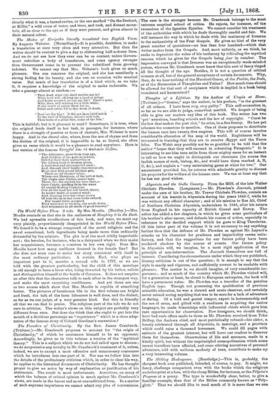The Medea of Euripides literally translated into English Verse. By
Augusta Webster. (Macmillan.)—It is possible, doubtless, to make a translation at once very close and very attractive. But then the writer should be content to give a day to elaborating half-a-dozen lines. And we do not see how they ever can be so content, unless Govern- ment subsidize a body of translators, and some agency stronger than Government come in to prevent the subsidized from growing indolent. We cannot say that Mrs. Webster's book gives us much pleasure. She can construe the original, and she has manifestly a strong feeling for its beauty, and she can on occasion write musical verse. But much of her translation is of a kind which, as we take it, it requires a knowledge of the original to make endurable. We take a passage almost at random :— " They dead, what city shall receive me in?
What host will, offering me a land of refuge And home assured, rercue my life? There's none.
Why, then, still waiting for a little while, If any tower of safety show for us, Silent and subtle I'll to this work of death.
" bostsee thy hap? It fits not thou yield mirth To the race of Sisyphus, Jason's new folk, Thou born of a great Sire, come of the Sun."
This is faithful; but is it pleasant to read ? Sometimes, it is true, when the original lends itself to her task, in passages, for instance, where there is a strength of passion or force of rhetoric, Mrs. Webster is more happy. And in the choral odes, where, from the use of rhyme and from the diction of the original, it is impossible to be so literal, she often gives us verse which it would be a pleasure to read anywhere. Here is her version of tho famous EpEzOst kt r e srceXcctio OXStet.
"The Athenians, groat from long ago, And children of the gods in heaven,
Still for their daily nurture-know
The loftiest food of wisdom given.
A hallowed and unconquered state ; And, through their bright translucent air, Move ever with proud jubilant gait, There as old rhymes relate, Where erst Harmonic, of the yellow hair, The virgin nine Pierian muses bare.
There, too, the ancient lay runs thus,—
Once Cypris, quaffing from the wave Of crystal-flowing Cephissus, O'er all the land her soft breath draw, In tender wafts of scented wind: And, donning over her sweet crown Of rose-bloom in her loose locks twined, Her vassal loves, assigned Rind ministers to wisdom, she sends down, And helpmates in all deeds of good renown."






























 Previous page
Previous page